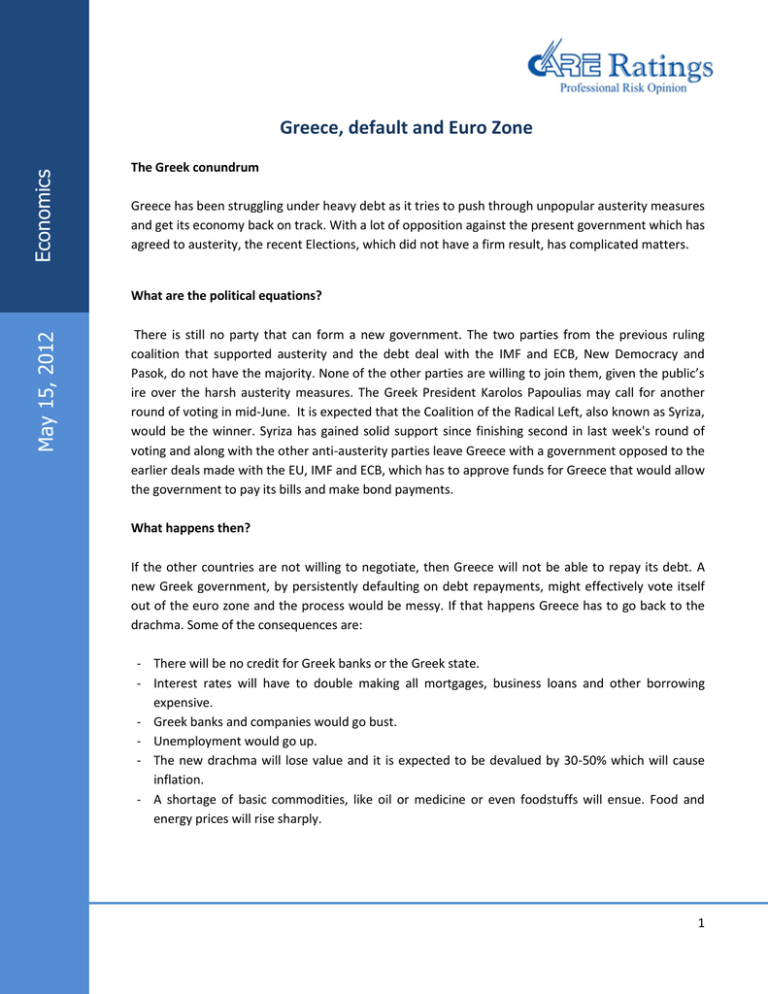Greece, default and Euro Zone s ic
advertisement

Economics Greece, default and Euro Zone The Greek conundrum Greece has been struggling under heavy debt as it tries to push through unpopular austerity measures and get its economy back on track. With a lot of opposition against the present government which has agreed to austerity, the recent Elections, which did not have a firm result, has complicated matters. May 15, 2012 What are the political equations? There is still no party that can form a new government. The two parties from the previous ruling coalition that supported austerity and the debt deal with the IMF and ECB, New Democracy and Pasok, do not have the majority. None of the other parties are willing to join them, given the public’s ire over the harsh austerity measures. The Greek President Karolos Papoulias may call for another round of voting in mid-June. It is expected that the Coalition of the Radical Left, also known as Syriza, would be the winner. Syriza has gained solid support since finishing second in last week's round of voting and along with the other anti-austerity parties leave Greece with a government opposed to the earlier deals made with the EU, IMF and ECB, which has to approve funds for Greece that would allow the government to pay its bills and make bond payments. What happens then? If the other countries are not willing to negotiate, then Greece will not be able to repay its debt. A new Greek government, by persistently defaulting on debt repayments, might effectively vote itself out of the euro zone and the process would be messy. If that happens Greece has to go back to the drachma. Some of the consequences are: - There will be no credit for Greek banks or the Greek state. - Interest rates will have to double making all mortgages, business loans and other borrowing expensive. - Greek banks and companies would go bust. - Unemployment would go up. - The new drachma will lose value and it is expected to be devalued by 30-50% which will cause inflation. - A shortage of basic commodities, like oil or medicine or even foodstuffs will ensue. Food and energy prices will rise sharply. 1 Economics The externalities Greece is a peripheral euro nation and does not hold wealth in the form of say, oil. Its main source of income is agriculture and tourism and accounts for less than 5% of the European Union's economic output. However, cascading bank defaults in Greece would create fear as investors will take out money out of Portuguese and Spanish banks. This contagion effect of that default would result in a run on banks in the rest of the periphery as investors seek to remove their deposits from the “next likely to fall” country. Investors will most certainly flee the debt of the other weaker economies struggling with their own sovereign debt issues. Yields could soar on government debt for Portugal and Ireland, Spain and Italy. The 5-years credit default swap rates have already increased substantially and as of 15th May were as follows: Greece: 63%, Italy 4.8%, Spain 5.3%, Portugal 11.6%, Ireland 6.29% and France 2.14%.This will also increase the costs for the remaining European governments that are paying for various bailouts. In fact coming to the market for more loans will be a challenge which will impact their deficits. Even in this best case scenario, one in which measures to prop up the non-Greek sovereign debt work, the austerity measures needed to pay for them would send the remaining countries of the euro zone and EU into an even deeper, more prolonged downturn. That would weigh on the already slowing growth in both the United States and Asia. If larger countries follow Greece out of euro zone, it could cause a meltdown in the European banking sector that holds billions of Euros of sovereign debt of the other troubled economies, as well as private sector loans to consumers. In turn, businesses in those countries would be unable to pay given their suddenly devalued currency. How about the USA? American banks already have sharply reduced their exposure to Greece by more than 40% to $5.8 billion. While, they have relatively limited exposure to European sovereign debt, they do have exposure to the European banking system which means that the meltdown in European markets would be felt in across the world. Many pension funds, insurance companies and other big investors have dumped or written off investments in Greece such as government bonds. But market will respond to a default is a matter of conjecture. However, so far, exports have been a bright spot for the U.S. and Europe has played a big role. More than half of U.S. foreign investment and a fifth of all American exports go to the EU. A significant slowdown there could mean less revenue for U.S. companies, less expansion at home and possible loss of jobs for American workers. What about the euro? The euro will continue to get hit as this imbroglio continues and the dollar can seen to be strengthening at the expense of the Euro. The movement could be towards the 1.25 mark to begin with until a solution is reached either through debt service or an exit also called the Grexit these days. Greece, default and Euro Zone 2 Economics Will India be affected? No direct effect as Greece is very small in the Indian story. However, any impact on the euro region or US markets will have a direct impact on India. The rupee is already under pressure and will continue to get hit on account of the stronger dollar, which will add to our own fundamental imbalances which have led to the rupee depreciation. Trade would be hit at the margin though our exports are now well diversified across regions. Capital flows through foreign investment, will be jolted as funds would rebalance their portfolios. Therefore, it could be choppy weather for our markets. Contact: Madan Sabnavis Chief Economist madan.sabnavis@careratings.com 91-022-67543489 Anuja Jaripatke Associate Economist Anuja.jaripatke@careratings.com 91-022-67543552 Disclaimer This report is prepared by the Economics Division of Credit Analysis & Research Limited [CARE]. CARE has taken utmost care to ensure accuracy and objectivity while developing this report based on information available in public domain. However, neither the accuracy nor completeness of information contained in this report is guaranteed. CARE is not responsible for any errors or omissions in analysis/inferences/views or for results obtained from the use of information contained in this report and especially states that CARE (including all divisions) has no financial liability whatsoever to the user of this report. Credit Analysis and Research Limited proposes, subject to receipt of requisite approvals, market conditions and other considerations, to make an initial public offer of its equity shares and has filed a draft red herring prospectus (“DRHP”) with the Securities and Exchange Board of India (“SEBI”). The DRHP is available on the website of SEBI at www.sebi.gov.in as well as on the websites of the Book Running Lead Managers at www.investmentbank.kotak.com, www.dspml.com, www.edelcap.com, www.icicisecurities.com, www.idbicapital.com, and www.sbicaps.com. Investors should note that investment in equity shares involves a high degree of risk and for details relating to the same, see the section titled “Risk Factors” of the DRHP. This press release is not for publication or distribution to persons in the United States, and is not an offer for sale within the United States of any equity shares or any other security of Credit Analysis & Research Ltd. Securities of Credit Analysis & Research Ltd., including its equity shares, may not be offered or sold in the United States absent registration under U.S. securities laws or unless exempt from registration under such laws. Greece, default and Euro Zone 3








